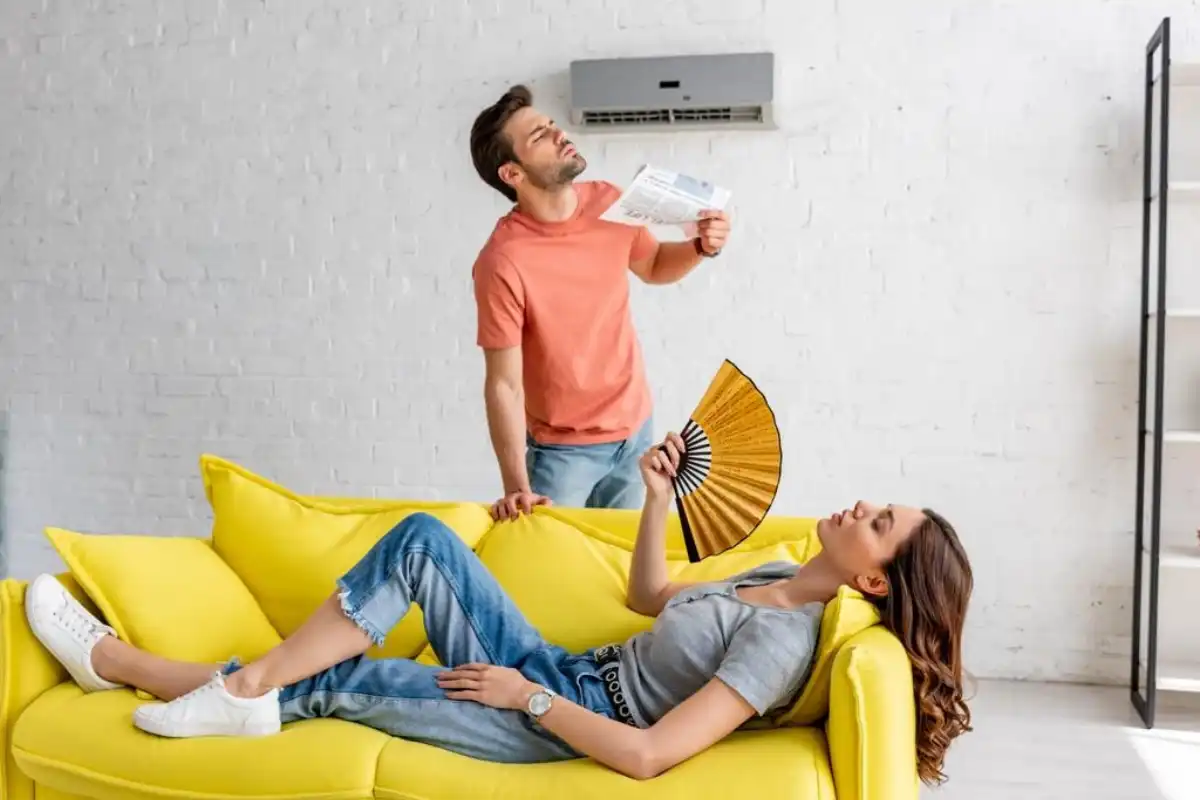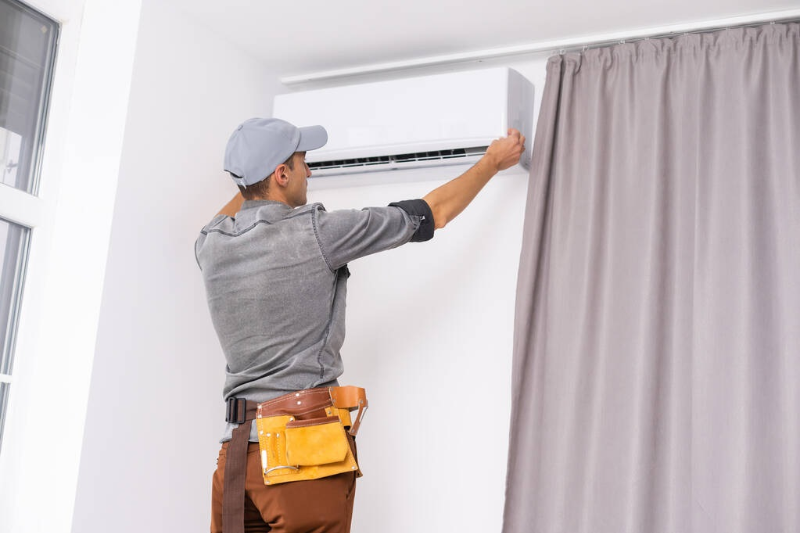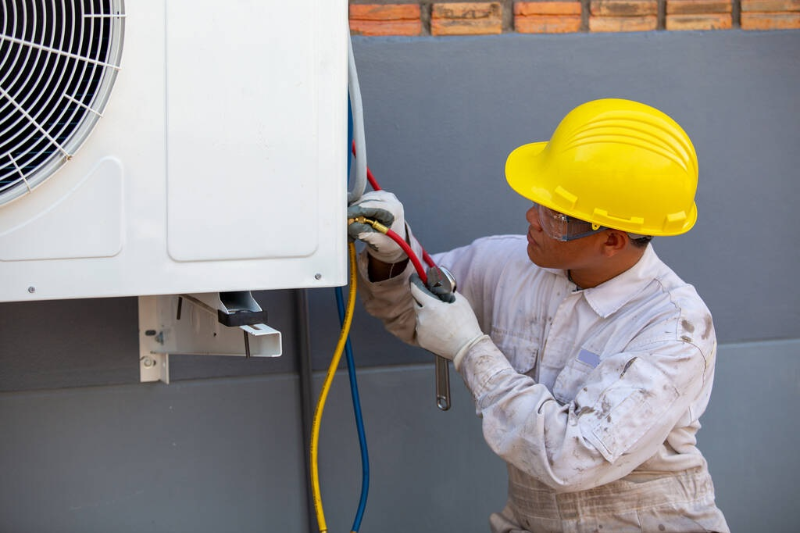Table Of Contents
When the sweltering summer heat rolls in, there’s nothing more comforting than the cool embrace of an air conditioner (AC). But here’s the catch: choosing the right-sized AC for your space is crucial. Many homeowners believe that bigger is always better, but that’s not necessarily the case.
In this article, we’ll explore the question: Can an AC be too powerful? We’ll dive into the science of air conditioning, the signs of an oversized AC unit, the impact on your health and the environment, and, ultimately, how to find the perfect balance for your cooling needs.
Signs of an Overpowered AC

Frequent on-off cycling
One of the telltale signs that your AC is too powerful for your space is the frequent on-off cycling. This is known as “short cycling.” Your AC unit cools the room rapidly, leading it to reach the set temperature too soon. As a result, it turns off, only to restart shortly afterwards, repeating this cycle continuously.
Uneven cooling and humidity issues
An overpowered AC can quickly cool one area of your room while leaving other regions too warm and humid. This uneven cooling can lead to discomfort and frustration, as some parts of your home may feel like a refrigerator while others remain sticky and hot.
Reduced energy efficiency
Paradoxically, oversized AC units tend to be less energy-efficient. Their constant cycling consumes more energy than a suitably sized unit, resulting in higher utility bills. So, not only is an overpowered AC more expensive to purchase, but it also continually drains your wallet with higher operating costs.
The shortened lifespan of the AC unit
The frequent on-off cycling of an overpowered AC places additional strain on the unit’s components. This may result in premature wear and tear, reducing the lifespan of your expensive investment. In contrast, an appropriately sized unit runs more consistently, resulting in less strain and a longer useful life.
Increased utility bills
Expect a significant spike in your energy bills if you’re running an AC that’s too powerful for your space. The energy inefficiency of short cycling and constant power consumption can substantially increase your monthly expenses.
Health and Comfort Implications

Temperature fluctuations and discomfort
When your AC is too powerful, it can cool your space so quickly that it becomes uncomfortable. Rapid temperature fluctuations can make it feel like you’re trapped in a temperature rollercoaster, which is far from the consistent comfort you expect.
Impact on indoor air quality
An often overlooked consequence of an overpowered AC is its impact on indoor air quality. As it struggles to dehumidify the air properly, moisture can linger, creating an environment where mould and allergens thrive. This can exacerbate allergies and respiratory problems for those in your household.
Mould and moisture issues
Moisture control is vital for a healthy indoor environment. An overpowered AC’s inability to remove moisture effectively can lead to mould growth, not to mention the discomfort of a sticky, muggy atmosphere.
Exacerbating allergies and respiratory problems
Excessive moisture and poor indoor air quality can worsen allergies and respiratory issues. Mould spores and other allergens proliferate in high humidity, precisely what an oversized air conditioner can foster.
The importance of proper humidity control
Proper humidity control is an essential aspect of your indoor comfort. An AC that’s too powerful struggles to maintain the optimal humidity level, typically around 40-60%. Inadequate humidity control can result in various problems, from dry skin and respiratory issues to static electricity and damage to your home.
Environmental Consequences
High energy consumption and carbon footprint
One of the most significant concerns with an overpowered AC is its environmental impact. An inefficient AC consumes more energy, contributing to a higher carbon footprint. With the growing focus on environmental responsibility, it’s essential to consider the ecological implications of your cooling choices.
The strain on power grids
An oversized AC isn’t just an issue for your household; it can strain local power grids, especially during peak demand periods. This can result in power outages or the need for grid upgrades to meet the increased load.
Impacts on global warming and climate change
The excess energy consumption from oversized air conditioner units contributes to global warming and climate change. Considering the broader environmental effects of your cooling choices in a world increasingly focused on sustainability is essential.
Importance of energy-efficient cooling systems
Opting for an appropriately sized, energy-efficient AC is more cost-effective for you and a responsible choice for the environment. Energy-efficient cooling systems are designed to deliver cooling power while minimising energy consumption and environmental impact.
Environmental responsibility in AC selection
Choosing an HVAC system should go beyond your personal comfort. It’s a choice with environmental consequences, and considering energy-efficient, properly sized units is an environmentally responsible decision.
Finding the Right Balance

Calculating the appropriate AC size
Calculating the appropriate size for your space is the key to avoiding the pitfalls of an overpowered AC. Professionals use industry-standard calculations considering room size, insulation, sun exposure, and other factors to determine the correct BTU rating.
Importance of professional assessment
While online calculators can provide a general idea of your AC needs, a professional assessment by an HVAC technician is invaluable. They will thoroughly evaluate your residential property or commercial businesses specific requirements, ensuring you get a perfectly sized unit.
Considering insulation and home layout
Factors like insulation quality and your home’s layout are essential considerations. A well-insulated home may require a smaller AC, while large open spaces might necessitate a zoned cooling system or multiple units for optimal comfort.
Balancing cooling needs with energy efficiency
The ideal AC unit balances your cooling needs with energy efficiency. Your goal should be to keep your home comfortable while minimising energy consumption. Modern AC systems offer a range of energy-saving features that can help you achieve this balance.
The role of zoning and programmable thermostats
Zoning systems and programmable thermostats provide a granular approach to cooling. They allow you to cool different areas of your home at different times, increasing efficiency and comfort.
Maintenance and Efficiency

Regular AC maintenance practices
Proper maintenance is crucial to the efficiency and longevity of your AC unit. Regularly cleaning or filter replacement, keeping the condenser coils clean, and checking for refrigerant gas leaks are essential maintenance tasks.
Importance of clean filters and coils
Dirty filters and coils can restrict airflow, reducing your AC’s efficiency. Ensure to clean or replace filters according to manufacturer recommendations and schedule professional maintenance to clean coils as needed.
Adjusting AC settings for optimal performance
Most modern AC units come with various settings and features. Learning how to use them to your advantage can significantly improve efficiency. For instance, using the “fan-only” mode or adjusting the fan speed can help maintain a comfortable and efficient environment.
Scheduling professional tune-ups
Regular professional tune-ups, typically conducted annually, are an investment in your AC’s performance and longevity. These check-ups ensure that all components function correctly, refrigerant levels are optimal, and the unit is clean and well-maintained.
Investing in energy-efficient models
If you’re in the market for a new AC unit, consider investing in an energy-efficient model with a high SEER (Seasonal Energy Efficiency Ratio) rating. These units are designed to deliver cooling power while minimising energy consumption.
Alternative Cooling Solutions

Evaporative coolers and their suitability
In arid climates, evaporative coolers (swamp coolers) can be an energy-efficient alternative to traditional ACs. They use water evaporation to cool the air and can suit specific regions and applications.
Ductless mini-split systems for zoned cooling
Ductless mini-split systems offer zoned cooling, allowing you to condition specific areas of your home. These mini-split and ductless air conditioning systems are versatile, energy-efficient, and often an excellent solution for spaces with unique cooling needs.
Window units and portable ACs
Window units and portable air conditioners are options for smaller spaces or those on a budget. While they might not provide the same level of comfort and efficiency as central air conditioners, they can be a temporary or cost-effective solution.
Heat-reducing home improvements
Improving your home’s energy efficiency through insulation, sealing leaks, and installing energy-efficient windows can reduce your cooling needs. These home improvements can help you maintain a comfortable environment without relying on an overpowered AC.
The future of energy-efficient cooling technologies
We expect to see more energy-efficient and sustainable cooling solutions as technology advances. Keep an eye on emerging trends in the HVAC industry to make informed choices for your home.
Cost Considerations
Initial AC unit cost
While opting for the largest AC you can afford is tempting, remember that a bigger unit often comes with a higher initial cost. However, this upfront expense doesn’t necessarily translate into long-term savings.
Operating and maintenance costs
A properly sized, energy-efficient AC unit may have a higher upfront cost but can yield substantial savings in operating and maintenance costs over its lifespan.
Long-term savings with the right-sized AC
Choosing the right-sized AC means reaping long-term financial benefits. You’ll save on utility bills, reduce repairs and maintenance expenses, and extend the life of your unit.
Incentives and rebates for energy-efficient systems
Many utility companies provide incentives and rebates for energy-efficient cooling systems. Take advantage of these programs to offset the initial cost of an efficient unit.
Weighing the overall cost-effectiveness
When considering your AC options, it’s crucial to weigh the overall cost-effectiveness. This includes initial expenses, operating costs, maintenance, energy savings, and any available incentives.
Make the Right Choice Today
In the world of cooling, size matters. Make the right choice today by ensuring your AC or water heater is just the right fit for your space. Keep cool, save energy, and protect the environment by consulting a professional air conditioning company. It’s time to take action for a more comfortable, efficient, and sustainable future. Your perfect balance is just a choice away.



